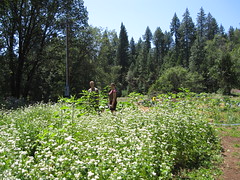For some people organic gardening is a fun, relaxing pastime, whereas for others it can be a major headache. This list of tips should help you become a successful organic gardener.
You can easily make a new garden for your perennials in just a few steps. Cut under the dirt with a spade and turn it over. Next, cover the area with three to four inches of organic wood chips. After about three weeks, you may cut into this bed to plant your perennials.
Companion Plants
Organic gardening sounds like a new fad but in fact it is the tried and true method that existed long ago before the advent of chemicals. Native Americans taught the pilgrims how to plant crops by using a fish with the seeds in the ground. Start a nice compost pile in order to make your own fertilizer for an organic garden. Compost piles not only reduce the amount of trash put in landfills, but also helps to increase output of your garden’s produce.
An exciting way to garden is by using the concept of companion plants. Some plants, when placed near other plants, actually help their neighbor plants grow. Some companion plants have environmental benefits, such as pest reduction or soil enrichment, so that you do not need to use harmful chemicals. For example, any plant that has a heavy smell will help repel pests.
Instead of rinsing your vegetables in the sink, rinse them outdoors with fresh water. This water can be saved and used in your garden. Things that come off of the vegetables, like nutrients and dirt, can be put back into the garden and give it things that it can’t get otherwise. Avoid using chemicals or objects to clean the vegetables, as doing either of these things will render it ineffective.
Take the season and weather conditions into account when determining how much water to give your plants. Knowing how much to water your plants can be a difficult task. You will want to look into various things, such as time of day, quality of water and type of soil. Gardeners in warm, moist climates should avoid watering leafy plants as this makes them more vulnerable to fungal growths. Instead, water the roots only.
Pine is a wonderful mulch so do not discard the idea. Many types of plants thrive in soil that has high acid levels. If your garden contains plants like this, there are few things simpler than spreading some pine needles across your beds. Spread the needles over the beds in a layer that is approximately 2-inches deep. Over time, the needles will begin to decay, supplying the soil with acid as they do.
Consider the value of the crops you choose to grow. It is true that the amount of value that a certain plant has is different to everyone. If you’re growing plants that are expensive to buy, you can save a lot in the future. Plant foods you love, enjoy the results and save money.
Be sure you know how you should buy plants that you want to add in your organic garden. This is evident when purchasing perennials or annuals. Get the budded ones, not the ones in bloom. This ensures that the plant has a better chance of taking root in your garden.
Do some research on the botanical insecticides that are available in your area, many of which are extremely helpful in preventing pests from invading your garden. Natural insecticides are sometimes more effective than the myriad synthetic, chemical-based products available. However, botanical pesticides rot rather quickly and tend to disappear.
Coffee grounds can benefit many types of soil. Coffee grounds have a lot of nutrients that plants can use. The coffee grounds act as a powerful nitrogen source that will help your plants bloom much quicker.
Water your organic garden using a soaker hose. With a soaker hose, you actually help your plants grow to their potential because the water slowly seeps out the hose which helps guide it to the roots, allowing the leaves to remain dry. Instead of hand watering the plants, which can be tiresome, go with a soaker hose that uses less water.
Use about two to three inches of organic material as mulch in all of your flower beds. This practice is an easy way to discourage weeds, retain moisture, and add valuable nutrients to your garden. A layer of mulch also creates a more attractive appearance.
You can get fertilizer by making compost from scratch. You can do this easily by setting up a worm composting bin. Red worms, soil, kitchen scraps and shredded newspaper will be a good base for your compost bin.
Garlic can be simple to grow organically. Cloves of garlic should be planted in well-drained soil with frequent watering in either the fall or spring. Plant them approximately 4 inches apart at a depth of 1 or 2 inches beneath the surface of the soil with the pointed end facing upward. As the garlic shoots grow, you can snip them and use them for cooking. You know your bulbs are ready when they turn brown on their tops. After harvesting, leave the bulbs out in the sun until the skin hardens. This helps them dry out. Store them somewhere cool, in tied bunches or loose.
Organic Gardening
Organic gardening is a more involved form of gardening than is often realized. It requires patience and work, but it’s worth it to have a successful organic garden. Simply by reading through the techniques provided to you in this article, you should find yourself much more informed and capable of organic gardening
If you enjoyed reading this great article above written by one of our guest blog writers and are considering landscaping services for a home and live in Las Vegas, NV we’ll be very happy be of service to you! You can contact us here.


